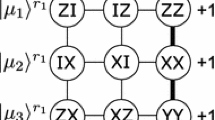Abstract
Gödel’s incompleteness applies to any system with recursively enumerable axioms and rules of inference. Chaitin’s approach to Gödel’s incompleteness relates the incompleteness to the amount of information contained in the axioms. Zurek’s quantum Darwinism attempts the physical description of the universe using information as one of its major components. The capacity of quantum Darwinism to describe quantum measurement in great detail without requiring ad-hoc non-unitary evolution makes it a good candidate for describing the transition from quantum to classical. A baby-universe diffusion model of cosmic inflation is analyzed using quantum Darwinism. In this model cosmic inflation can be approximated as Brownian motion of a quantum field, and quantum Darwinism implies that molecular interaction during Brownian motion will make the quantum field decohere. The quantum Darwinism approach to decoherence in the baby-universe cosmic-inflation model yields the decoherence times of the baby-universes. The result is the equation relating the baby-universe’s decoherence time with the Hubble parameter, and that the decoherence time is considerably shorter than the cosmic inflation period.
Similar content being viewed by others
References
Ananthaswamy A. (2008) Quantum darwinism. The foundational questions inst. News 7: 1–3
Borde A., Guth A. H., Vilenkin A. (2003) Inflationary spacetimes are incomplete in past directions. Physical Review Letter 90: 151301–151304
Burgess C. P., Holman R., Hoover D. (2008) On the decoherence of primordial fluctuations during inflation. Physics Review D 77: 063534–063548
Calzetta E., Verdaguer E. (2006) Real time approach to tunneling in open quantum systems: Decoherence and anomalous diffusion. Journal of Physics A 39: 9503–9532
Chaitin G. J. (2005) Meta math!. Random House, New York
Gibbons G. W., Hawking S. W. (1977) Action integrals and partition functions in quantum gravity. Physical Review D 15: 2752–2756
Gödel K. (1931) Über formal unentscheidbare Sätze der Principia mathematica und verwandter Systeme I. Monatshefte für Mathematik und Physik 38: 173–198
Guth A. H. (1981) Inflationary universe: A possible solution to the horizon and flatness problems. Physical Review D 23: 347–356
Hu, B. L., Paz, J. P., & Zhang, Y. (1995). Quantum origin of noise and fluctuations in cosmology. gr-qc/9512049, 1–32.
Kiefer C., Lohmar I., Polarski D., Starobinsky A. A. (2007) Pointer states for primordial fluctuations in inflationary cosmology. Classical Quantum Gravity 24: 1699–1718
Linde A. (2005) Particle physics and inflationary cosmology. Contemporary Concepts of Physics 5: 1–362
Lombardo F. C. (2005) Influence functional approach to decoherence during Inflation. Brazilian Journal of Physics 35: 391–396
Lombardo F. C., Mazzitelli F. D., Rivers R. J. (2003) Decoherence in field theory: General couplings and slow quenches. Nuclear Physics A 672: 462–486
Martineau F. (2007) On the decoherence of primordial fluctuations during inflation. Classical Quantum of Gravity 24: 5817–5834
McQuarrie D.A. (1975) Statistical mechanics. Harper & Row, New York
Panikkar R. (1989) The silence of God: The answer of the Buddha. Orbis Books, Maryknoll, NY
Rovelli C. (2004) Quantum gravity. Cambridge University Press, Cambridge
Smolin L. (2002) Three roads to quantum gravity. Perseus Books Group, New York
Von Neumann J. (1955) Mathematical foundations of quantum mechanics. Princeton University Press, Princeton
Wheeler, J. A. (1990) Information, physics, quantum: The search for links. Physics Department, University of Texas.
Zurek W.H. (2002) Decoherence and the transition from quantum to classical—revisited. Los Alamos Science 27: 86–109
Zurek, W. H. (2003a). Quantum darwinism and envariance. quant-ph/0308163v1, 1–17.
Zurek W. H. (2003b) Decoherence, einselection, and the quantum origins of the classical. Reviews of Modern Physics 75: 715–775
Zurek W. H. (2005) Probabilities from entanglement, Born’s rule p k = |Ψ k |2 from envariance. Physical Review A 71: 052105–052133
Author information
Authors and Affiliations
Corresponding author
Rights and permissions
About this article
Cite this article
Lori, N.F., Blin, A.H. Application of Quantum Darwinism to Cosmic Inflation: An Example of the Limits Imposed in Aristotelian Logic by Information-based Approach to Gödel’s Incompleteness. Found Sci 15, 199–211 (2010). https://doi.org/10.1007/s10699-010-9174-y
Published:
Issue Date:
DOI: https://doi.org/10.1007/s10699-010-9174-y




